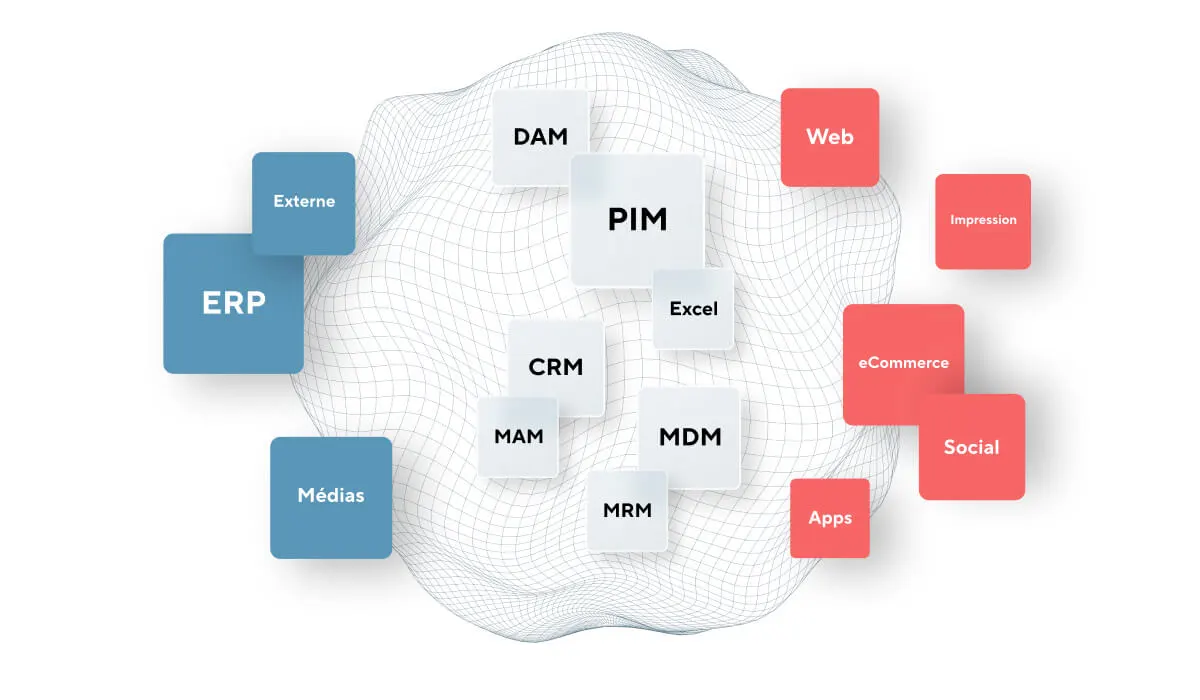MDM: what is it?


A true precursor to digital transformation and a ‘Data-Driven’ strategy, Master Data Management is the keystone in the development of organisations, and a forward-looking concept in data management.
But what is Master Data Management really? Why is it so interesting to implement it in your company? What data can be managed using MDM?
Definition of Master Data Management
By definition, Master Data Management (MDM) is the set of tools used to store, manage and distribute reference data within an organisation. This set of tools ensures that reference data is correctly identified, usable without risk, error-free and of good quality.
More specifically, Master Data Management centralises data in a single master repository, to simplify the organisation of the company. This method makes it easier to share data securely between employees and different departments.
Put simply, the role of MDM is above all to ensure data uniqueness. In other words, thanks to MDM, all data is linked within a single, unique repository. But that’s not all. This solution offers enhanced security, the maintenance of data quality and governance, and data traceability.

A project?
Why use a MDM solution?
Master Data Management tools address three key issues that your company may be facing today:
- Data silos and different versions of your data
- Obsolescence, in other words, data that is out of date and therefore unreliable
- Data errors due to manual maintenance
The problem of data silos
Many companies still have to deal with data silos, a term used to describe isolated, disconnected information and applications. In other words, data is scattered across the enterprise and business applications do not communicate with each other. As a result, the lack of coherence and rationalisation of information has an impact on the smooth running of an organisation.
This problem affects both the players involved and the company’s strategy. Whether it’s customer, employee, supplier or product data, all data must be usable, secure, scalable and reusable. The non-quality of this data represents a considerable risk for your company. As well as generating significant costs, incorrect and out-of-date data can also alter customer knowledge. As a result, the actions taken within the company based on this unqualified data are distorted.

The solution provided by Master Data Management
Data quality remains a key issue for your company. Master Data Management solutions solve these problems by covering all the company’s systems. Data is consolidated, cleansed, categorised, secured and updated.
Instead of having data scattered across several files, MDM centralises it, eliminates duplicates and combines incomplete data to create a ‘golden record’, which acts as a single version of the truth, linking the company’s different systems.
Most of the time, companies’ reference data is scattered across several tools. With Master Data Management, all data is centralised in a master database. This solution also encompasses the concepts of :
- DAM (Digital Asset Management), for organising and distributing digital resources.
- PIM (Product Information Management), for coordinating and distributing product information.
- SCV (Single Customer View), for all customer data, both basic and behavioural.
Since the data is distributed in real time to the various departments, all the teams have access to the accuracy of the information. This makes it an excellent tool for marketing departments, as it enables them to understand customers’ buying habits and to target them more effectively on the basis of their interests and past purchase history. It then enables teams to optimise the customer experience by unifying systems. This solution saves a considerable amount of time and enables the company to develop its products in line with consumer needs.
What are the advantages of a Master Data Management solution?
Master Data Management offers a number of advantages to companies that are concerned about their data.
The increasingly digital nature of business places the importance of data management at the forefront. But what are the real benefits of MDM for the corporate ecosystem?
As you will have realised, a Master Data Management solution is essential if companies are to exploit the vast amount of information they create every day.
The benefits are considerable. On one hand, teams save time because they can easily find their files, so they can concentrate more easily on their usual tasks. On the other, decision-makers can implement appropriate strategies, thanks to the right information being conveyed.
What are the business challenges of MDM?
MDM must provide a strategic and structured view of all company data, in order to improve operational efficiency. Implementing this data management system therefore involves some serious challenges.
Optimising IT infrastructures
Optimising IT infrastructures is undoubtedly the main challenge of Master Data Management. Indeed, as previously stated, for years companies have been building their architectures around data silos. Today, it is important to break out of this segmented organisation if we want to improve the overall functioning of the business. To do this, you need to turn to data management platforms tailored to your needs.
Business performance
Master Data Management is a major growth driver for businesses. Data guides the players involved in decision-making and action. Master data management tools enable a company’s managers and decision-makers to anticipate the best directions to take.
Data security
The security of IT data has always been a crucial issue for businesses. In this way, the challenge of MDM is also to ensure the confidentiality and security of data within the company.

Who needs a MDM solution?
MDM is particularly valuable for companies with a large number of IT departments and applications. It is also very useful when companies merge.
For companies that place digital transformation at the heart of their strategy, Master Data Management is an essential data management solution. MDM is often of interest to large-scale or complex businesses that manage vast quantities of data. However, it is also in the interests of medium-sized businesses and SMEs to centralise their data.
Even if your information system contains only a few applications and seems to be under control, MDM is a concept for the future that it is useful to integrate into a marketing strategy in all cases, with a long-term vision. The reason for this is that you are not immune to the effects of more or less controlled developments to the information system as your business is rolled out.
As soon as you are looking to develop a complete ecosystem, the data must not be dispersed. Otherwise, your data is likely to be difficult to use, which will have a direct impact on the company’s results.
In this sense, Master Data Management is a discipline that can be applied to all businesses, whatever their size: communications agencies, advertising agencies, e-commerce shops, retail outlets, manufacturing companies and so on.

Where does MDM fit into the corporate ecosystem?
Today, there are a number of business applications and data managers that are necessary for the smooth running of a company. Some of the best-known are :
- ERP (Enterprise Resource Planning) software
- CRM (Customer Relationship Management) software
- PLM software (Product Lifecycle Management)
- WMS (Warehouse Management System) software packages
With a MDM solution, all applications are linked together. This means that elements linked to a tool can easily be added to the data in the repository. For example, the WMS can add data linked to a product, and the CRM can provide statistics on that same product.
The Master Data Management is the fuel that must circulate throughout the company’s ecosystem to guarantee its successful development. This process connects easily to business applications, enabling data to be imported from a variety of sources. In this way, data can be shared seamlessly between different departments. With an MDM solution, the company’s entire ecosystem is involved: IT, marketing, communications, sales, customer service, delivery, …
What are the functionalities of Master Data Management solutions?
Scattered data in the information system makes it difficult to have a clear view of the information. Master Data Management tools integrate a number of functions, such as
- Product data consolidation
- Data cleansing
- Enrichment, classification and translation
- Data quality control and maintenance
- Workflows and business processes (validation, collaborative completeness, etc.)
- Supplier management
- Cross-reference management
- Lifecycle management
- Multi-channel distribution
- Mass deletion of relationships
How do you choose your MDM solution?
Deploying Master Data Management can be a long and costly process, but it is essential for any business, because it addresses specific needs in terms of traceability, quality, validation and access to data.
However, each MDM solution has been designed for a specific use. The most important thing is to define your needs clearly. They will determine the best MDM solution for you. Depending on the objectives to be achieved, the technological choices may be different. To choose the right MDM solution, there are several points to bear in mind:
- The ability to communicate with other applications in the current and future Information System
- Data mapping and quality control
- The life cycle of reference data
- Regulatory requirements
How can a MDM project be a success?
A project of this type requires a complete roadmap to be created in order to best define the functional specifications. Listing the requirements identified and the various construction stages depends on a precise knowledge of the foundations of your ‘data and process’ architecture. To ensure the success of your Master Data Management project, you need to take stock of :
- The structure of your current internal processes
- The business issues that are driving you to invest
- The channels through which the information will be distributed
- The data collection flows produced upstream
- Your budget for the project
- The nature of the schedule intended to frame the project
- The qualitative and quantitative objectives of this investment
Master Data Management significantly improves operational efficiency, freeing up resources to bring value to other sectors. Implementing a Master Data Management solution revolutionises the way in which data is used, as it enables us to work in near-real time, so that we can offer products or services in line with consumer expectations. In conclusion, managing, controlling and disseminating the right information at the right time is a real challenge for businesses on a daily basis. However, it’s a fact: companies that capitalise on their data are very successful.
MDM solutions are precisely what the new world demands. Is your company in the midst of a digital transformation? Do you need to centralise your data because of a large number of files? Then it’s probably time for you to invest in a new data management strategy.
Do you need help in defining the scope of your Master Data Management project? Ask our experts!


